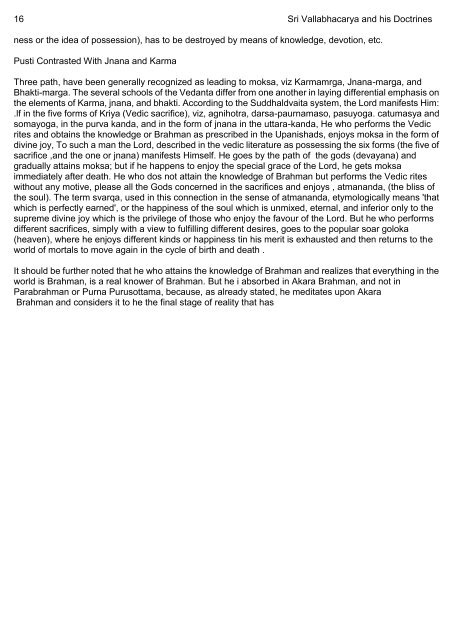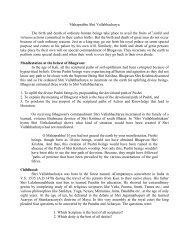Sri Vallabhacharya - Pushti Darshan
Sri Vallabhacharya - Pushti Darshan
Sri Vallabhacharya - Pushti Darshan
You also want an ePaper? Increase the reach of your titles
YUMPU automatically turns print PDFs into web optimized ePapers that Google loves.
16 <strong>Sri</strong> Vallabhacarya and his Doctrines<br />
ness or the idea of possession), has to be destroyed by means of knowledge, devotion, etc.<br />
Pusti Contrasted With Jnana and Karma<br />
Three path, have been generally recognized as leading to moksa, viz Karmamrga, Jnana-marga, and<br />
Bhakti-marga. The several schools of the Vedanta differ from one another in laying differential emphasis on<br />
the elements of Karma, jnana, and bhakti. According to the Suddhaldvaita system, the Lord manifests Him:<br />
.lf in the five forms of Kriya (Vedic sacrifice), viz, agnihotra, darsa-paurnamaso, pasuyoga. catumasya and<br />
somayoga, in the purva kanda, and in the form of jnana in the uttara-kanda, He who performs the Vedic<br />
rites and obtains the knowledge or Brahman as prescribed in the Upanishads, enjoys moksa in the form of<br />
divine joy, To such a man the Lord, described in the vedic literature as possessing the six forms (the five of<br />
sacrifice ,and the one or jnana) manifests Himself. He goes by the path of the gods (devayana) and<br />
gradually attains moksa; but if he happens to enjoy the special grace of the Lord, he gets moksa<br />
immediately after death. He who dos not attain the knowledge of Brahman but performs the Vedic rites<br />
without any motive, please all the Gods concerned in the sacrifices and enjoys , atmananda, (the bliss of<br />
the soul). The term svarqa, used in this connection in the sense of atmananda, etymologically means 'that<br />
which is perfectly earned', or the happiness of the soul which is unmixed, eternal, and inferior only to the<br />
supreme divine joy which is the privilege of those who enjoy the favour of the Lord. But he who performs<br />
different sacrifices, simply with a view to fulfilling different desires, goes to the popular soar goloka<br />
(heaven), where he enjoys different kinds or happiness tin his merit is exhausted and then returns to the<br />
world of mortals to move again in the cycle of birth and death .<br />
It should be further noted that he who attains the knowledge of Brahman and realizes that everything in the<br />
world is Brahman, is a real knower of Brahman. But he i absorbed in Akara Brahman, and not in<br />
Parabrahman or Purna Purusottama, because, as already stated, he meditates upon Akara<br />
Brahman and considers it to he the final stage of reality that has



